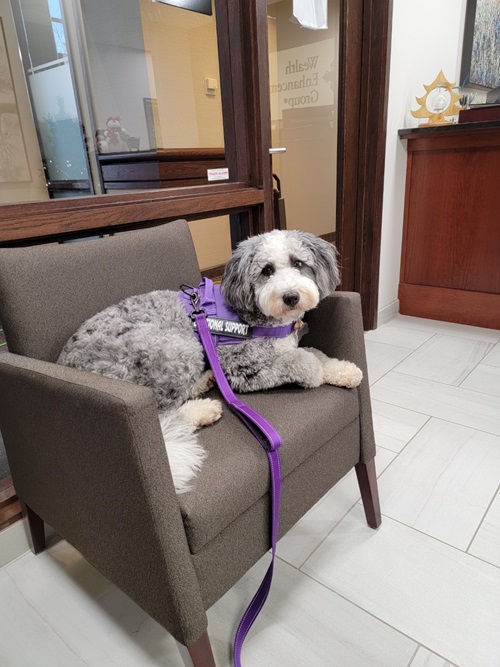
Breast cancer discovery to survivorship: one patient’s journey at AHCI
In February 2021, Melissa Lukoskie had planned to skip her routine mammogram. People were still socially isolating because of the COVID-19 virus.
But Melissa’s four children were grown, and she was living alone with her dog. She had been working remotely — as a client services representative for a financial services company — for almost a year since the start of the pandemic. So even though she considered canceling the appointment, she decided it was a good excuse to get out of the house.
Melissa was shocked when her mammogram results came back suspicious for breast cancer. She was then 60 years old with no family history of breast cancer. “I thought, ‘You have the wrong number,’’’ she says.
Finding whole-person care after cancer treatment
Further diagnostic tests confirmed that Melissa had breast cancer. Within a short time, she had a lumpectomy, followed by chemotherapy and radiation therapy at Allina Health Cancer Institute (AHCI).
After these treatments, Melissa found that her cancer journey was far from over. For her, the initial cancer treatment was the easy part. “You do what smart people tell you to do,” she says. The harder part was coping with the changes to her entire body. Her treatments were finished, but she still had pain, swelling and fatigue. “I was in tears,” she recalls.
That October, Melissa’s oncologist referred her to Liat Goldman, MD, an AHCI physician specializing in cancer rehabilitation.
Dr. Goldman says being a “cancer survivor” is not a short-term state. It extends throughout the person’s life. AHCI works with patients to develop a customized, coordinated plan that helps them return to better long-term health and the ability to do their usual activities.
“We help patients access the resources and services they need for whole-person care,” Dr. Goldman says. “The beauty of this program is seeing someone go from a point where they may not be doing well and helping them get to a point where they are doing well.”
Dr. Goldman connected Melissa with various resources that are part of AHCI’s survivorship care. “She was my miracle worker. She understood what I was saying,” Melissa says.
Melissa benefited from:
- Physical therapy: Melissa started physical therapy to improve her range of motion, reduce scar tissue and increase endurance. She received a prescription for a wearable medical device to help reduce breast tissue swelling (lymphedema).
- Virtual support groups: She met with other cancer survivors in virtual support group sessions for six weeks. During those sessions, AHCI’s experts presented information on subjects like self-care and integrative oncology services. Melissa used some of these services — therapeutic touch, aromatherapy and guided imagery — as part of her healing work.
- Talk therapy: Melissa also started individual counseling sessions with Beth Johnson, MSW, which continue to be highly valuable. “Talk therapy has been the most impactful. It has made me feel understood, seen and validated,” she notes.
Cancer survivorship: discovering a new normal

The changes that cancer brought to Melissa’s life have been challenging, but they haven’t all been negative. “I kind of feel that I got more out of cancer than it took from me. A lot of good things have come from it,” she says. “It gave me more awareness of life, of choices and of who and what is important to include in your sphere of control.”
After a lifetime of being a people pleaser, Melissa gained perspective. She has learned to listen to her body and now does what she needs to do. “I’m not a people pleaser any longer,” she observes. For example, she doesn’t apologize when she is tired. “When I need to sleep, I go to sleep.”
AHCI’s cognitive rehabilitation services also helped Melissa learn to cope with “chemo brain” —the mental fogginess that chemotherapy can create. To combat her trouble with concentration and memory, she learned tips and tools to help her stay organized. She used those brain skills in April 2022 when she returned to a hybrid work schedule, combining in-person and remote office work.
Another positive event came in January 2022 when Melissa got Lexi, a miniature Bernedoodle, a cross between a Bernese mountain dog and a smart poodle. During her early days of chemotherapy, Melissa’s dog of 14 years died. She had had a dog her entire life. Beth encouraged her to adopt another one to provide additional support during her recovery.
Lexi is now a certified emotional support dog and accompanies Melissa on her days in the office. “She is emotional support for me. And she brings a lot of joy to everybody,” says Melissa.
Dr. Goldman says any adult who has completed cancer treatment within Allina Health’s system is a candidate for AHCI’s Cancer Survivorship services. No matter when the patient completed their treatment, they can receive an assessment to see what resources might benefit them.
AHCI’s services can help cancer survivors access resources and discover what Melissa describes as, “Finding out what your new normal can be.”
“You don’t know what to ask for if you don’t know what you need,” Melissa says.
How to refer a patient to AHCI’s cancer survivorship program
Providers within Allina Health can send an Ambulatory Consult referral directly to Survivorship using Epic, our electronic medical records system.
Providers outside of Allina Health can refer patients by calling our nearest cancer center:
- AHCI Buffalo: 763-684-7747
- AHCI Cambridge: 763-688-8700
- AHCI Coon Rapids: 763-236-0808
- AHCI Faribault: 507-497-3721
- AHCI Hastings: 651-404-1515
- AHCI Minneapolis: 612-863-0200
- AHCI New Ulm: 507-217-5562
- AHCI River Falls: 715-307-6430
- AHCI St. Paul: 651-241-5111
For additional questions, Dr. Liat Goldman welcomes direct contact from providers.